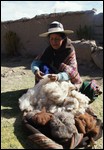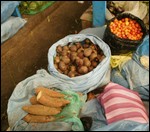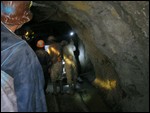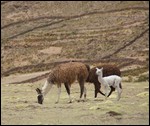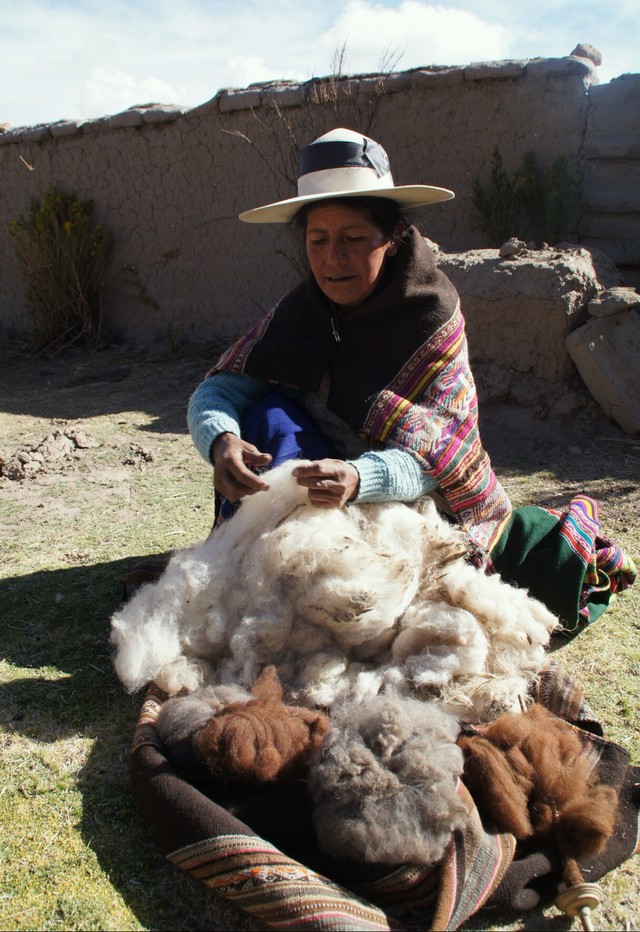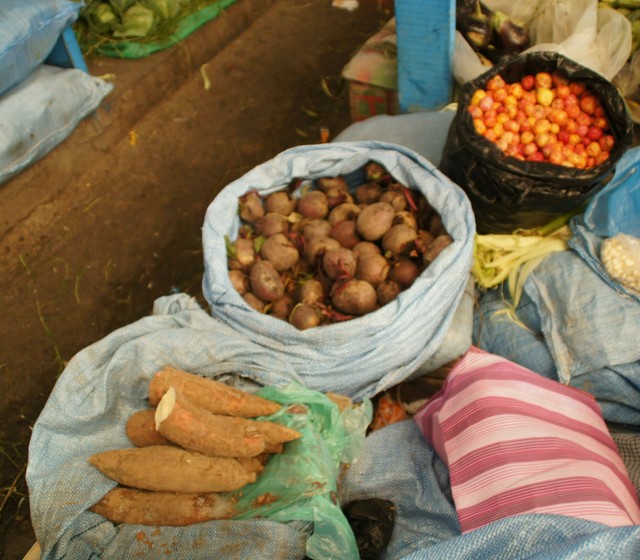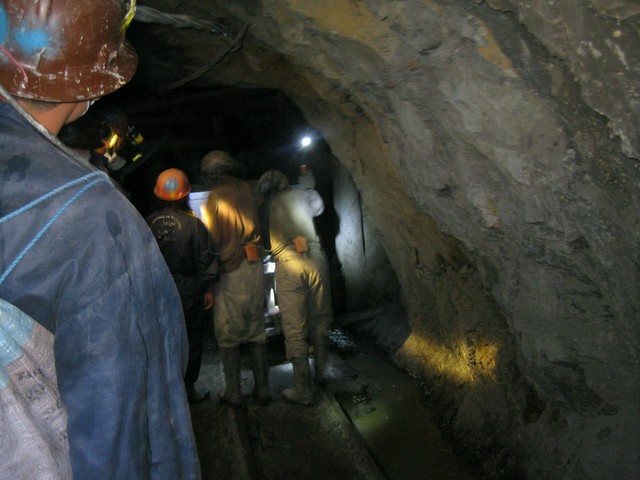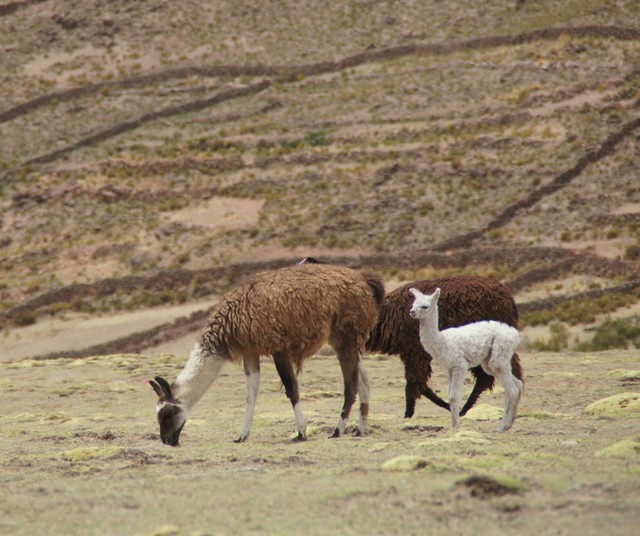El Alto is the highest airport in the world, and most of La Paz not much lower. Last time I was here, roughly four years ago, I had slowly ascended from sea level to 3-4 km and basically stayed there. This time, however, I flew in from the +0 of Ushuaia, via the +25 of BA and the +400 of Santa Cruz, and the effects wouldn't wait. After having checked in, gone for lunch and checked teh interwebs I decided a quick nap would do me good. A nap that lasted the rest of the day, as it were.
As I had reached the highpoint of the trip, literally, I had high hopes of repeating what might have been the highpoint, figuratively, the last time I was in the neighbourhood: Mountainbiking down the world's most dangerous road. However, the booking office was closed due to it being Sunday, and they would open at 9 next morning. As the day of death-defying downhilling would mean pick-up at 7:30 and I didn't have a Tardis, I had to put the pedalling off. Instead I opted for one of those free walking tours around the city.
Two very enthusiastic and entertaining locals led a large flock of westerners around what is technically not the capitol of Bolivia (Sucre is). They shared tales of how the infamous San Pedro prison is more of a small city in the city, with hookers and blackjack and drugs. They told of Bolivia's shaky democratic past, including presidents who were crazy, or evil, or both. They told about the age-old traditions of burying llama phoeti, coca leaves and 96%-proof booze as a sacrifice to Pachamama, Mother Earth, before any building construction could start. They even shared that in order to properly please Pachamama, a human sacrifice needed to be claimed by the earth, and in order to do so, builders would go to the wrong side of the tracks, so to speak, find a drunkard no one would miss to fill with booze until he would pass out, and thereafter be put into the ground for Pachamama to claim.
Roughly four years ago, I went with Dragoman from Quito to La Paz. It was now high time to continue that journey. A large group of mostly Aussies and an unusually high percentage of couples set off in the large orange-and-white truck, led by tour leader Linda and co-driver Zebulon. Leaving La Paz and its sister city El Alto behind, we headed for the wilderness, eventually reaching the small community of Livchuco. The road seemed straight and wide towards our destination, but as is often the case in Bolivia, the road was blocked by disgruntled protesters. This time it was miners who were protesting the horrible conditions and low pay, and so had blocked the road, creating a several kilometres long line of waiting vehicles. Thanks to some offroading and the very modest bribe of 50 bobaroonies (arond 5 euros) we eventually got moving again. Livchuco is populated by Aymaras who live off the land, and especially the llamas and alpacas that feed on its vegetation. Skillful textile-makers they are, and we were shown the ropes, so to speak. As to their skills at cooking the cameloids, let's just say the soup was served in very nice bowls.
Back in civilisation, but still on altitudes of more than 4000 metres, Zeb maneuvered Eva the truck through the narrow and steep maze-like streets of Potosi. Once the most populous city in the New World, this town lives, breathes, shits and dies silver. Ever since colonial times, the surrounding mountains have been mined for silver in a ruthless fashion. Back in those days, slaves were used, but circumstances hasn't changed much. The miners, exclusively indigenous people, have no choice but to work under horrifying conditions, doing hard labour at high altitude, using equipment and materials they need to buy themselves. The tunnels are narrow and claustrophobia-inducing, the ore is transported on trolleys pushed by hand (no electrical trains here) and the security measures regarding handling the dynamite and, most importantly, its detonators, are nonexistant. Add to the fact that dealing with the depression this kind of work triggers means drinking heavily, the risks of accidents increase sharply. And if broken bodies due to heavy labour and the daily risk of getting injured or killed in uncontrolled explosions and cave-ins weren't enough, the risks of getting lung cancer due to constantly breathing the silica dust is 100% or so close it makes no matter. Oh, and silver is not the only metal in the mountains; zink and lead features heavily, and so the contaminated masses and the water used to treat the ore spoils the area, leading to lead related diseases and fucked-up environmental issues for centuries to come. All for a select few to get filthy rich from the silver; the other 99% just get filthy.
Potosi is on roughly 4000 metres above sea level, as indicated by the name of one of its nicer restaurant, The 4060. The town itself is bustling with life, both hispanic and indigenous, and its night-life rivals that of La Paz. In addition, even if its products taste as bland as most non-western countries' lagers, Potosi hosts the world's highest brewery, Potosina. And the beer is bottled in 1 litre or 3 litre bottles.
To summarize: I flew to high altitude in La Paz, watched Aymaras do their textile skills and went into the silver mines of hell.
Fun factoid: It is well-known, to those who know it well, that according to the constitution, a president can only serve two terms in the country of Bolivia. Evo Morales got over that little hurdle by changing the official name from República de Bolivia to Estado Plurinacional de Bolivia. Putin now plans to be the indefinate ruler of Russia using the same tactics, in turn changing the name from The Russian Federation, to United States of Russia, to Democratic and Totally not Despotic and In Fact Really Friendly and Nice to Children and Puppies Justice-filled Equal Solidary Democracy of Russia, to Putinistan. And so on, and so forth, in that manner.
.
